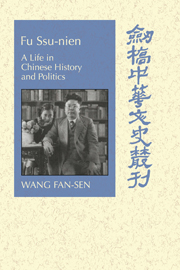Book contents
- Frontmatter
- Contents
- Acknowledgments
- List of Abbreviations
- Chronology
- Introduction: Fu Ssu-nien and Post-1895 Intellectual Trends
- 1 Fu Ssu-nien's Early Years
- 2 The Shaping of a New Historical School
- 3 Toward a Theory of Plural Origins of Chinese Civilization: Hypotheses on Ancient Chinese History
- 4 Contra-Introspective Moral Philosophy
- 5 The Burden of the May Fourth Mentality
- 6 Statism and the Later Days of a May Fourth Youth
- Conclusion: The Defeat of a May Fourth Youth
- Appendix I A Fragment from a Short Story Attacking Ku Chieh-kang
- Appendix II A Transcript of a Conversation between Fu Ssu-nien and Ch'en Pu-lei
- Glossary
- Bibliography
- Index
Appendix I - A Fragment from a Short Story Attacking Ku Chieh-kang
Published online by Cambridge University Press: 01 February 2010
- Frontmatter
- Contents
- Acknowledgments
- List of Abbreviations
- Chronology
- Introduction: Fu Ssu-nien and Post-1895 Intellectual Trends
- 1 Fu Ssu-nien's Early Years
- 2 The Shaping of a New Historical School
- 3 Toward a Theory of Plural Origins of Chinese Civilization: Hypotheses on Ancient Chinese History
- 4 Contra-Introspective Moral Philosophy
- 5 The Burden of the May Fourth Mentality
- 6 Statism and the Later Days of a May Fourth Youth
- Conclusion: The Defeat of a May Fourth Youth
- Appendix I A Fragment from a Short Story Attacking Ku Chieh-kang
- Appendix II A Transcript of a Conversation between Fu Ssu-nien and Ch'en Pu-lei
- Glossary
- Bibliography
- Index
Summary
The following is a fragment from a short novel written by Fu Ssu-nien, in which he satirizes the methodology used by Ku Chieh-kang to dismiss the authenticity of ancient Chinese history. Ku was Fu's roommate at Peita and later became one of China's foremost historians, known for his iconoclastic analytical investigations into Chinese antiquity.
A Jocular Essay (Hsi-lun)
The First Act
… This half of the letter I found in an antique shop yesterday. It was written by a certain Li-pi-yu-che (a person who believes as a matter of course). When I returned home I consulted the Dictionary of Worthies, and found that ‘Mr. Li-pi-yu was a person of the thirty-third century who systematically doubted history of antiquity; he wrote ten large volumes entitled Ku-shih hsü-pien (a continuation of Ku-shih pien, Ku Chieh-Kang's representative work) … in which he argued that at the inception of Republican China many people's names were in fact forged by their contemporaries. Some were several different persons with the same names, others were one person with several names and still others were simply names not associated with real persons. All of these names were forgeries following the practice of Han scholars who set bewildering traps to confuse latecomers.
- Type
- Chapter
- Information
- Fu Ssu-nienA Life in Chinese History and Politics, pp. 205 - 206Publisher: Cambridge University PressPrint publication year: 2000

